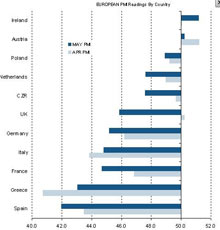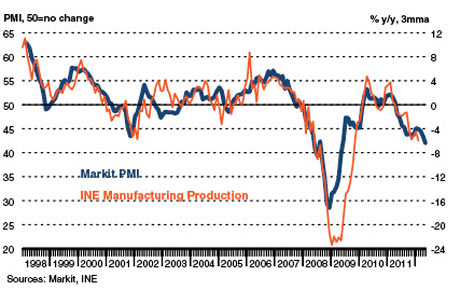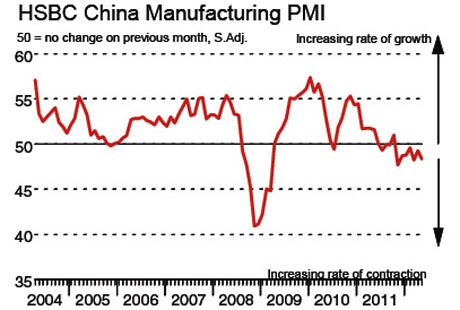http://www.zerohedge.com/news/greece-faces-electric-meltdown
and.....
http://www.athensnews.gr/portal/8/55985
http://www.ekathimerini.com/4dcgi/_w_articles_wsite1_14241_01/06/2012_444874
In the last opinion poll to be published by Kathimerini before the June 17 elections, leftist SYRIZA maintains a clear lead over New Democracy, although short of enough support for a clear parliamentary majority.
According to the Public Issue survey, SYRIZA garners 31.5 percent of the vote, 1.5 more than just a week ago. Support for New Democracy is largely unchanged at 25.5. PASOK has lost 2 percent and falls to 13.5. It is followed by Democratic Left (DIMAR) on 7.5 percent and the weakening Independent Greeks on 5.5. The Communist Party (KKE) also has 5.5 percent, while the neo-Nazi Chrysi Avgi (Golden Dawn) has fallen to 4.5 percent. The liberal alliance of Dimiourgia Xana (Recreate Greece) and Drasi attracts 2.5 percent.
In terms of parliamentary seats, this translates into 134 for SYRIZA, 68 for New Democracy, 36 for PASOK, 20 for DIMAR, 15 for KKE, 15 for Independent Greeks and 12 for Chrysi Avgi. Most would fall slightly if the liberals reach the 3 percent parliamentary threshold.
Most Greeks, however, are not convinced that SYRIZA will win. The poll indicates that 58 percent believes ND will come first and only 34 percent see the leftists triumphing.
SYRIZA leader Alexis Tsipras trails DIMAR chief Fotis Kouvelis as the most popular party head. Kouvelis has an approval rating of 67 percent, while Tsipras’s is at 49 percent.
Tsipras is due to present his economic program at noon on Friday. Speaking to Skai TV on Thursday, a member of the party’s economic team, Giorgos Stathakis, insisted that the next government would not run out of money soon despite fears that the European Union and International Monetary Fund may stop loans to Athens. “There is enough money for pensions and wages. A shortage of liquidity will only arise in the last two months of the year,” he said. “I think we will have a solution by then.”
SYRIZA intends to repudiate Greece’s loan deal with the European Union and International Monetary Fund and wants to negotiate a new deal with the country’s lenders.
Speaking to reporters on Thursday, IMF spokesman Gerry Rice said that the Washington-based fund is willing to listen to “any new ideas” that the next Greek government has with respect to how the fiscal targets agreed as part of the bailout can be achieved more effectively.
http://www.guardian.co.uk/business/blog/2012/jun/01/eurozone-crisis-global-slowdown-irish-referendum
 Eurozone manufacturing PMIs, up to May 2012. Photograph: Markit
Eurozone manufacturing PMIs, up to May 2012. Photograph: Markit



 Data: HSBC/Markit
Data: HSBC/Markit
Greece Faces Electric Meltdown
Submitted by Tyler Durden on 06/01/2012 08:18 -0400
Maybe the electrician-in-chief can send them some of those unused Solyndra solar panels?
From Reuters:
Greece's power regulator RAE told Reuters on Friday it was calling an emergency meeting next week to avert a collapse of the debt-stricken country's electricity and natural gas system."RAE is taking crisis initiatives throughout next week to avert the collapse of the natural gas and electricity system," the regulator's chief Nikos Vasilakos told Reuters.RAE took the decision after receiving a letter from Greece's natural gas company DEPA, which threatened to cut supplies to electricity producers if they failed to settle their arrears with the companyOr, as they call it in Greece, Friday.
and.....
http://www.athensnews.gr/portal/8/55985
| Syriza launches new programme | ||
| ||

A Radical Left Coalition (Syriza) would annul the memorandum, keep strategic companies under state control, freeze wage and pension cuts demanded by the troika if it wins the June 17 election, its leader announced on Friday.
Alexis Tsipras was speaking at the launch of Syriza's new programme, which he described as a "programme of dignity and hope".
Tsipras said he would also introduce measures to relieve the debt burden of overborrowed households and cut valued added tax (VAT), especially on basic food items.
He also said that the bailout memorandum should be abandoned, saying it had failed to take the country out of its economic crisis and would prevent it from having access to financial markets this decade.
"The first action of the government of the left will be the annulment of the memorandum and the implement laws," he said.
The memorandum, he continued, would be replaced "with a national recovery plan for economic and social growth and productive reconstruction".
In a speech replete with promises and commitments, he also promised to raise the minimum wage back to its original 751 euros and to unemployment benefit to 461.50 euros.
Moreover, dole would be paid for two years, instead of the current twelve months.
The Syriza leader also said banks receiving recapitalisation from the Hellenic Financial Stability Fund could face nationalisation.
Opinion polls show Syriza running neck and neck with the pro-bailout conservatives, with one poll on Friday showing the anti-bailout leftists with a six-point lead. (Athens News)
and......
| ||
http://www.ekathimerini.com/4dcgi/_w_articles_wsite1_14241_01/06/2012_444874
Going into final stretch, SYRIZA builds poll lead
 |
According to the Public Issue survey, SYRIZA garners 31.5 percent of the vote, 1.5 more than just a week ago. Support for New Democracy is largely unchanged at 25.5. PASOK has lost 2 percent and falls to 13.5. It is followed by Democratic Left (DIMAR) on 7.5 percent and the weakening Independent Greeks on 5.5. The Communist Party (KKE) also has 5.5 percent, while the neo-Nazi Chrysi Avgi (Golden Dawn) has fallen to 4.5 percent. The liberal alliance of Dimiourgia Xana (Recreate Greece) and Drasi attracts 2.5 percent.
In terms of parliamentary seats, this translates into 134 for SYRIZA, 68 for New Democracy, 36 for PASOK, 20 for DIMAR, 15 for KKE, 15 for Independent Greeks and 12 for Chrysi Avgi. Most would fall slightly if the liberals reach the 3 percent parliamentary threshold.
Most Greeks, however, are not convinced that SYRIZA will win. The poll indicates that 58 percent believes ND will come first and only 34 percent see the leftists triumphing.
SYRIZA leader Alexis Tsipras trails DIMAR chief Fotis Kouvelis as the most popular party head. Kouvelis has an approval rating of 67 percent, while Tsipras’s is at 49 percent.
Tsipras is due to present his economic program at noon on Friday. Speaking to Skai TV on Thursday, a member of the party’s economic team, Giorgos Stathakis, insisted that the next government would not run out of money soon despite fears that the European Union and International Monetary Fund may stop loans to Athens. “There is enough money for pensions and wages. A shortage of liquidity will only arise in the last two months of the year,” he said. “I think we will have a solution by then.”
SYRIZA intends to repudiate Greece’s loan deal with the European Union and International Monetary Fund and wants to negotiate a new deal with the country’s lenders.
Speaking to reporters on Thursday, IMF spokesman Gerry Rice said that the Washington-based fund is willing to listen to “any new ideas” that the next Greek government has with respect to how the fiscal targets agreed as part of the bailout can be achieved more effectively.
Rice also said IMF managing director, Christine Lagarde, regretted recent remarks concerning tax evasion by Greeks and comparing their suffering to children in Niger. “She regrets her remarks were misunderstood and caused offense, that was not her intention.”
and....
http://www.ekathimerini.com/4dcgi/_w_articles_wsite1_1_01/06/2012_444917
|
http://www.guardian.co.uk/business/blog/2012/jun/01/eurozone-crisis-global-slowdown-irish-referendum
Looking at Greece.... six different opinion polls were released this morning, on the last day that polling data can be released before the June 17 election.
As is now traditional, each poll paints a different picture of the situation. Five put New Democracy in the lead, by between 1.4% and 2.5%. The sixth gives Syriza a big lead, 6% ahead of New Democracy.
Details here (in Greek)
Declan Ganley, the millionaire businessman who led the free market anti-Europe Libertas group, has conceded this morning that Ireland has voted Yes.
Henry McDonald, our Irish correspondent, is now very confident that the Yes campaign has won the referendum on the fiscal compact.
Despite the No campaign winning in Donegal North East (see last post), the overall national picture firmly indicates that Ireland is on course to ratify the treaty.
In traditional eurosceptic Donegal North East they have gone against the national trend and voted
aagainst the treaty.
aagainst the treaty.
The vote divided 56% No, and 44% for the treaty, in the northwest constituency.
Europe's unemployment crisis has deepened further, with the news that the jobless rate is now at a record high of 11%.
Eurostat reported that the unemployment rate hit this all-time high in March, and maintained it in April.
As usual, the jobless data showed the stark differences between member stats of the eurozone.
The lowest unemployment rates for April were recorded in Austria (3.9%), Luxembourg (5.2%). the Netherlands (5.2%) and Germany (5.4%).
Spain again posted the highest jobless rate (24.3%), with Portugal (15.2%). New data wasn't available for Greece (where the unemployment rate was last recorded at 21.7% in February).
Yet more gloom -- the UK manufacturing sector sufferered its second-biggest fall in 20 years in May.
At 45.9, Britain's manufacturing sector experienced its biggest contraction since the middle of 2009. That's a really big fall, compared with April's 50.2.
Being outside the eurozone is not enough to spare Britain from what looks like a nasty economic slowdown.
More to follow.
And here's a graph of all this morning's eurozone manufacturing PMI data, following the news that the sector suffered its worst month in three years (see 9.07am)
 Eurozone manufacturing PMIs, up to May 2012. Photograph: Markit
Eurozone manufacturing PMIs, up to May 2012. Photograph: Markit
It shows how most countries' factory sectors contracted last month, with Spain and Greece suffering the most.
Economists say this morning's very weak manufacturing data (see 9.07am) means the eurozone economy is certainly shrinking at the moment.
Howard Archer of IHS Global Insight said the news was "hugely disappointing", and would mean GDP will fall in the current quarter:
It is evident that Eurozone manufacturers are currently finding life difficult amid very challenging conditions. Domestic demand is being handicapped by tighter fiscal policy in many Eurozone countries, still squeezed consumer purchasing power, and rising unemployment. Reinforcing manufacturers' problems relatively muted global growth is capping foreign demand for Eurozone goods. On top of this, the heightened problems in Greece and Spain are magnifying manufacturers' problems by adding to uncertainty about the outlook.
It's official -- the eurozone manufacturing sector just suffered its worst month since June 2009.
Following weak data from France, Germany and Spain (see previous posts) the total manufacturing PMI came in at 45.1, down from 45.9 in April, which means the sector contracted at a faster rate.
Indeed, only two countries didn't see their manufacturing sector shrink - Austria, and Ireland.
A double-whammy of bad data from France and Germany has shown that the Eurozone economy is in seriously bad shape.
Both countries posted their weakest manufacturing output in three years, with output shrinking at a faster rate in May
Markit reported that the French manufacturing PMI dropped to 44.7 in May, down from 46.9 in April.
The Germany manufacturing PMI was almost as weak, coming in at 45.2.
The poor data should extinguish any doubts that the Eurozone economic crisis was hitting core countries, as well as the periphery.
Today's manufacturing data from Italy is slightly more encouraging - unlike Spain and China, it's PMI actually rose in May. However, the sector is still shrinking (just at a slower pace).
Markit reported that the Italian manufacturing PMI came in at 44.8, up from April's 43.8. That still means that the sector has shrunk for the last 10 months. Unemployment also fell for 10th consecutive month.
Spain's factory sector suffered a serious decline in May, data just released showed.
Output fell at its fastest rate in three years, according to Markit, which reported that the Spanish manufacturing PMI dropped to 42, down from 43.5, indicating a deeper contraction.
Indeed, that's the weakest figure since May 2009, and means Spain's manufacturing base has now been shrinking since April 2011.

In another blow to a country already gripped by record jobless data, employment continued to fall as manufacturers restructured workforces in response to lower demand. Markit warned that:
The rate of job shedding intensified from that seen in April.
The big news overnight on the global economy is that China's manufacturing sector – one of the key engines of growth in the world economy – performed much worse than expected last month.
The official Chinese purchasing managers' index (PMI)* fell to 50.4 in May, much lower than April's 53.3. That puts it close to the 50-point mark that splits expansion from contraction.
More worryingly still, a separate PMI survey conducted by HSBC came in at 48.4 in May, down from April's 49.3, indicating that the sector had deteriorated last month. HSBC's data suggests China's manufacturing sector has been contracting for the last seven months:
 Data: HSBC/Markit
Data: HSBC/Markit
Analysts at IHS Global Insight said the data showed China is suffering its biggest economic slowdown since in two years, adding:
This indicates significant downside risk in the economy.
* - PMIs measure output, based on interviews with business people across an industry. We'll be hearing a lot about them today...




No comments:
Post a Comment